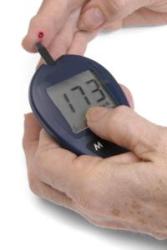May 27 2010
The ETH Zurich’s research team with Professor Sotiris E. Pratsinis and his team have developed a very sensitive acetone sensor by depositing a slim mixed ceramics nanoparticles semiconductor film from a flame plume between a group of gold electrodes.
 ETH Finger pricks now used to help monitor blood glucose levels in patients with diabetes could be replaced by an easy-to-use breath test
ETH Finger pricks now used to help monitor blood glucose levels in patients with diabetes could be replaced by an easy-to-use breath test
A semi-monthly journal named ‘ACS’ Analytical Chemstry’ has carried a report featuring this sensor.
The device functions as an electrical insulator whose resistance decreases when an air puff containing acetone-filled air, say from a diabetic person, strikes the device resulting in passage of more electricity between its electrodes. This resistance does not alter much if a healthy person breathes out into the nanoparticles. In most cases the research team was able to detect acetone in very moist air, a characteristic that is vital for all breath tests.
The sensitivity of the device enables it to detect 20 parts per billion of acetone concentration, a concentration level that is about 90 times less as compared to those in the exhaled breath of the diabetic patients. Type I category of diabetes patients normally release very high acetone levels while exhaling. Larger quantity of acetone will be exhaled by patients whose acetone build-up in blood is at a dangerous level.
According to the scientists, the sensor has been developed and tested successfully and is capable of indicating if the patient has type 1 diabetes immediately. The device can be utilized by doctors in emergency rooms to ascertain whether the patient is suffering from diabetic ketoacidosis, a prospective serious complication that occurs when diabetics do not take adequate quantities of insulin. In the future, this technology will be used in homes by diabetics to find out whether they require more insulin.
Source: http://www.ethz.ch